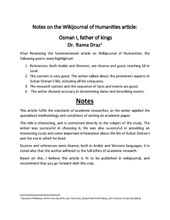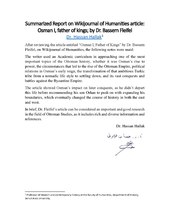Talk:WikiJournal of Humanities/Osman I, father of kings
Add topic
WikiJournal of Humanities
Open access • Publication charge free • Public peer review • Wikipedia-integrated
This article has been through public peer review.
It was adapted from the Arabic Wikipedia page عثمان_الأول and contains some or all of that page's content licensed under a CC BY-SA license. Post-publication review comments or direct edits can be left at the version as it appears on Wikipedia.
First submitted:
Accepted:
Article text
PDF: Download
DOI: 10.15347/WJH/2021.001
QID: Q99519061
XML: Download
Share article
![]() Email
|
Email
| ![]() Facebook
|
Facebook
| ![]() Twitter
|
Twitter
| ![]() LinkedIn
|
LinkedIn
| ![]() Mendeley
|
Mendeley
| ![]() ResearchGate
ResearchGate
Suggested citation format:
Bassem Fleifel (30 January 2021). "Osman I, father of kings". WikiJournal of Humanities 4 (1): 1. doi:10.15347/WJH/2021.001. Wikidata Q99519061. ISSN 2639-5347. OCLC 8897038424. Archived from the original on 14 April 2021. https://upload.wikimedia.org/wikiversity/en/5/58/Osman_I%2C_father_of_kings.pdf.
Citation metrics
AltMetrics
Page views on Wikipedia
Wikipedia: This work is adapted from the Wikipedia article Osman I (CC BY-SA). Content has also subsequently been used to update that same Wikipedia article Osman I.
License: ![]()
![]() This is an open access article distributed under the Creative Commons Attribution ShareAlike License, which permits unrestricted use, distribution, and reproduction, provided the original author and source are credited.
This is an open access article distributed under the Creative Commons Attribution ShareAlike License, which permits unrestricted use, distribution, and reproduction, provided the original author and source are credited.
Eystein Thanisch ![]() contact
contact
Rama Aziz Draz
Hassan Hallak
Article information
Plagiarism check
![]() Pass. Report from WMF copyvios tool (en) found only trivial overlap with external sources such as titles of references. Since the submission was translated from Arabic wikipedia, a check was also performed in that language: Report from WMF copyvios tool (ar) similarly found one instance of reverse plagiarism (where an external site mirrored an older version of the content) and instances of overlap in short phrases (e.g. "علاقة المُصاهرة بين العُثمانيين والشيخ القائد لِهذه الجماعة،"). T.Shafee(Evo﹠Evo)talk 01:36, 24 September 2020 (UTC)
Pass. Report from WMF copyvios tool (en) found only trivial overlap with external sources such as titles of references. Since the submission was translated from Arabic wikipedia, a check was also performed in that language: Report from WMF copyvios tool (ar) similarly found one instance of reverse plagiarism (where an external site mirrored an older version of the content) and instances of overlap in short phrases (e.g. "علاقة المُصاهرة بين العُثمانيين والشيخ القائد لِهذه الجماعة،"). T.Shafee(Evo﹠Evo)talk 01:36, 24 September 2020 (UTC)
Peer review 1
Review by Rama Aziz Draz ![]() , Faculty of Human Sciences, Department of History, Beirut Arab University (Assistant Professor); Imam Al Ouzai University (thesis Adviser)
, Faculty of Human Sciences, Department of History, Beirut Arab University (Assistant Professor); Imam Al Ouzai University (thesis Adviser)
These assessment comments were submitted on , and refer to this previous version of the article
After Reviewing the forementioned article on Wikijournal of Humanities, the
following points were highlighted: (1): References, both Arabic and Western, are diverse and good, reaching 58 in total. (2): The content is very good. The writer talked about the prominent aspects in Sultan Osman’s life, including all his conquests. (3): The research context and the sequence of facts and events are good. (4): The writer showed accuracy in determining dates and describing events.
This article fulfills the standards of academic researches, as the writer applied the specialized methodology and conditions of writing an academic paper.
The title is interesting, and is connected directly to the subject of the study. The writer was successful in choosing it. He was also successful in providing an interesting study and some important information about the life of Sultan Osman I and the era in which he lived.
Sources and references were diverse, both in Arabic and Western languages. It is noted also that the author adhered to the full ethics of academic research.
Based on this, I believe this article is fit to be published in wikijournal, and recommend that you go forward with this step.
Thank you Dr Draz for your notes and for reviewing this article. I appreciate your trust and encouraging remarks, which will defiantly lead me to write more articles related to the Ottoman sultans in particular and the Ottoman history in general. This will hopefully shed more light on this part of the Islamic history to readers from all spectra--باسم (discuss • contribs) 16:22, 25 September 2020 (UTC)
Peer review 2
Review by Hassan Hallak ![]() , Faculty of Human Science, Department of History, Beirut Arab University (link: https://www.bau.edu.lb/Staff/Human-Sciences/Hassan-Hallak/402); Imam AL Ouzai collage
, Faculty of Human Science, Department of History, Beirut Arab University (link: https://www.bau.edu.lb/Staff/Human-Sciences/Hassan-Hallak/402); Imam AL Ouzai collage
These assessment comments were submitted on , and refer to this previous version of the article
After reviewing the article entitled “Osman I, Father of Kings” by Dr. Bassem Fleifel, on Wikijournal of Humanities, the following notes were made:
The writer used an Academic curriculum in approaching one of the most important topics of the Ottoman history, whether it was Osman’s rise to power, the circumstances that led to the rise of the Ottoman Empire, political relations in Osman’s early reign, the transformation of that ambitious Turkic tribe from a nomadic life style to settling down, and its vast conquests and battles against the Byzantine Empire.
The article showed Osman’s impact on later conquests, as he didn’t depart this life before recommending his son Orhan to push on with expanding his boundaries, which eventually changed the course of history in both the east and west.
In brief, Dr. Fleifel’s article can be considered an important and good research in the field of Ottoman Studies, as it includes rich and diverse information and references.
Thank you Dr Hallak for your encouraging words and for reviewing this article. I'm really glad that it won the trust of a well-known historian like you.
Indeed more research is needed especially about the early Ottoman era, which is still shrouded in mystery, and the whole timeline of the empire in general, which was subjected to a lot of abuse since its fall and up to this day. Hopefully peer-reviewed open access articles such as WikiJournal of Humanities will help clearing the true history of the Ottomans, which is the last chapter in the large story of the Islamic history--باسم (discuss • contribs) 16:41, 25 September 2020 (UTC)
Correction
Comments by Thomas Shafee ![]()
![]()
![]() ,
,
A correction was made after acceptance for publication (but before PDF production) to remove an image incorrectly attributed as the subject's sword (diff).




